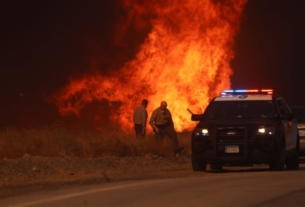Azerbaijan’s Foreign Ministry ordered the suspension of BBC News’ Azerbaijani operations on Thursday. However, the ministry stated that one journalist would be allowed to continue working in the country.
The ministry did not provide a specific reason for the decision. It only stated that Azerbaijan follows the principle of reciprocity in its decisions and dealings with foreign media.
Press freedom in Azerbaijan has faced growing criticism in recent years. According to Reporters Without Borders, at least 21 media professionals are currently imprisoned in the country.
President Ilham Aliyev has rejected concerns about the arrests of journalists. He has insisted that Azerbaijan has both a free press and unrestricted internet access.
The BBC said in a statement that it was forced to close its office after receiving a verbal order from Azerbaijan’s Foreign Ministry. The organization called the decision restrictive and a blow to press freedom.
“We deeply regret this restrictive move against press freedom,” the BBC said. The statement added that the suspension would hinder its ability to report on Azerbaijan for audiences inside and outside the country.
The BBC confirmed that it was seeking further clarification from Azerbaijan. It has not yet received an official explanation beyond the initial verbal order.
The suspension comes amid growing concerns over media restrictions in Azerbaijan. International organizations have repeatedly criticized the country for limiting independent journalism.
Azerbaijan ranks poorly on global press freedom indexes. Reporters Without Borders lists it as one of the most repressive countries for journalists in the region.
Government officials have dismissed accusations of media suppression. They claim that foreign outlets operate freely as long as they follow local regulations.
The closure of BBC News’ Azerbaijani operations follows similar moves against other media outlets. Independent journalists in the country have faced increased pressure and legal action.
Media watchdogs warn that the situation could worsen. Many fear that Azerbaijan’s government is tightening its control over information ahead of upcoming political events.
The BBC has not announced how it will continue reporting on Azerbaijan. Its editorial teams may rely on external correspondents or alternative methods to gather news.
Azerbaijan’s Foreign Ministry has not commented further on whether the suspension is permanent. It remains unclear if the restrictions will extend to other international media organizations.
The move has drawn criticism from human rights and press freedom groups. They argue that restricting access to foreign news organizations harms the public’s right to information.
Some analysts believe Azerbaijan’s decision could impact its international relations. Countries that prioritize press freedom may view the move as a step toward greater censorship.
For now, BBC News’ Azerbaijani-language service will operate remotely. The organization has reaffirmed its commitment to reporting on the country despite the obstacles.




